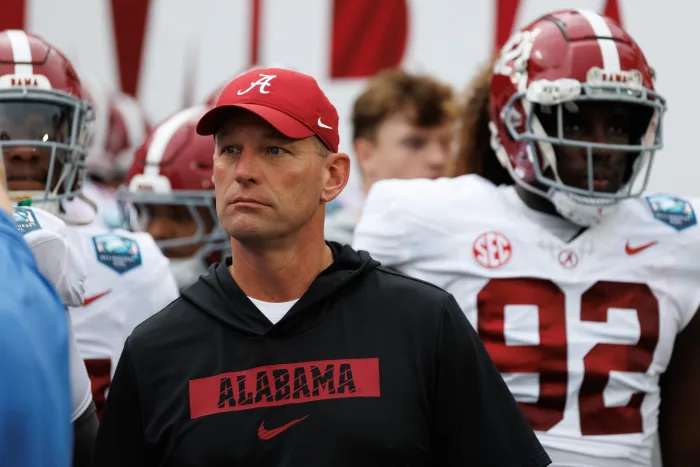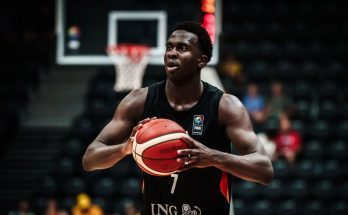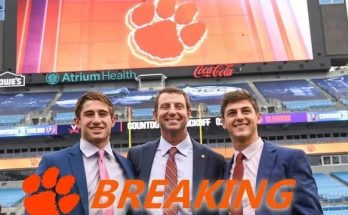Alabama football, a program synonymous with dominance, tradition, and unrelenting excellence, now finds itself under a cloud of controversy that could redefine the narrative surrounding its future under new leadership. Long considered the gold standard in college football, the Crimson Tide have suddenly been thrust into the spotlight for all the wrong reasons. Allegations of tampering involving a star quarterback from a College Football Playoff-caliber program have ignited a national firestorm, calling into question the integrity of one of the sport’s most iconic institutions. The accusations have surfaced at a time when college football is already undergoing seismic changes with the advent of NIL, the loosening of transfer restrictions, and the ever-expanding power struggles between coaches, players, boosters, and administrators.
At the heart of the controversy lies the claim that Alabama illegally reached out to a high-profile quarterback before he officially entered the NCAA Transfer Portal—a move that would violate strict NCAA rules designed to maintain competitive balance and order within the chaotic modern recruiting landscape. The alleged tampering doesn’t just raise legal and ethical questions; it potentially strikes at the core of how top programs operate in the shadows to secure elite talent. The quarterback in question—an emerging star who led his team to a College Football Playoff appearance—has not publicly accused Alabama of wrongdoing, but whispers among insiders, cryptic social media posts, and statements from family members have added fuel to the growing firestorm.
For Alabama, the timing of this scandal could not be more precarious. The transition from the Nick Saban era to the Kalen DeBoer regime was already a high-wire act, with fans and media alike scrutinizing every move to determine whether the Crimson Tide could maintain their status as perennial contenders. DeBoer, fresh off a successful run at Washington, entered Tuscaloosa with great expectations and a mandate to win immediately. But allegations like these, even if unproven, can undermine credibility and create distractions that ripple far beyond the walls of the football facility. And in the current climate, perception is often just as powerful as reality.
The NCAA’s rules are clear: no school may contact a player from another program unless that player has officially entered the Transfer Portal. The rule is designed to prevent backchannel communications and under-the-table deals, which have become more prevalent as NIL money has skyrocketed. Tampering, in this context, doesn’t just mean a phone call from a head coach—it could be as simple as a text message from an assistant, a direct message from a booster, or even a conversation facilitated by a “friend of the program.” The lines have become blurred, and enforcement remains a major challenge for the NCAA.
In Alabama’s case, the allegations hinge on whether there was premature contact, either directly or through intermediaries, with the quarterback before he made his transfer intentions known. While no official investigation has been announced, the noise around the situation has reached a fever pitch, and many in the college football world are calling for transparency and accountability. Fans of rival programs have seized on the opportunity to question whether Alabama’s decade-plus of dominance was built entirely on fair play. Meanwhile, Crimson Tide supporters are fiercely defending their program, insisting that the accusations are baseless and likely driven by envy or misinformation.
What makes this story even more complex is the evolving nature of college football itself. The NCAA has lost much of its enforcement power in recent years, and with NIL collectives now functioning like shadow athletic departments, it’s increasingly difficult to trace who said what to whom, and when. Coaches have expressed frustration with the “Wild West” mentality that now governs recruiting and transfers, lamenting that tampering has become almost impossible to police. In that environment, even a well-meaning conversation can be interpreted as a rules violation if the timing or context is off.
For DeBoer, this early test could prove defining. Taking over for a legend like Saban was always going to involve scrutiny, but being accused—directly or indirectly—of violating NCAA rules is an entirely different beast. DeBoer has publicly emphasized doing things the right way, prioritizing culture and long-term sustainability over short-term wins. But the reality is, the college football arms race doesn’t allow much time for patience. Programs are expected to win now, especially ones with Alabama’s legacy and expectations. Whether or not these allegations prove to be true, they have already complicated DeBoer’s honeymoon period in Tuscaloosa.
The ripple effects of this controversy go far beyond Alabama. Other coaches are watching closely, knowing that how the NCAA responds—or fails to respond—could set a precedent for future cases. If Alabama escapes unscathed, it could embolden other programs to push the envelope, knowing that enforcement is weak and consequences are minimal. On the other hand, if the NCAA brings down sanctions or even opens an official investigation, it could signal a new era of accountability that many believe is desperately needed.
Then there’s the human side of the story. The quarterback at the center of the allegations, though not named in official reports, has suddenly found himself at the heart of a media frenzy. His loyalty, decision-making, and motivations have been questioned publicly, despite no evidence that he did anything wrong. That’s the collateral damage of the modern college football landscape, where a young athlete’s every move can become fodder for speculation, especially when powerhouse programs like Alabama are involved. His current school is likely feeling the heat as well, forced to defend its player while navigating the possibility that one of the game’s biggest brands tried to poach him from their roster.
Booster influence, too, has come under renewed scrutiny in the wake of the allegations. It’s no secret that powerful donors play a significant role in recruiting, often funding NIL deals and using their influence to attract players to their preferred programs. If a booster associated with Alabama reached out to the quarterback or his family—whether overtly or subtly—it could still be viewed as tampering under NCAA guidelines. Yet proving that such a conversation took place, and that it was done with the knowledge or blessing of the coaching staff, is an entirely different challenge.
What this entire situation underscores is the fragility of college football’s current ecosystem. With the old guard of regulation eroding and the new guard of player empowerment on the rise, the game is in a state of flux. Allegations like those facing Alabama are likely to become more common, not less, as the line between recruiting and tampering continues to blur. The only way forward may be a complete overhaul of the system—one that includes clear, enforceable rules and greater transparency from all parties involved.
For now, Alabama remains squarely in the crosshairs. Whether these allegations prove to be a bump in the road or the beginning of a deeper unraveling remains to be seen. What’s clear is that the Crimson Tide, a program that has long set the standard for excellence on the field, now finds itself needing to defend its reputation off of it. In college football, perception is everything—and right now, the perception around Alabama is one of a program playing dangerously close to the edge.
If the past is any indication, the Crimson Tide will fight back hard. They will circle the wagons, issue denials, and trust that their track record of success will outweigh any temporary PR setbacks. But the rest of the country is watching closely. Because in the high-stakes world of college football, even the perception of impropriety can be enough to shift the balance of power.



